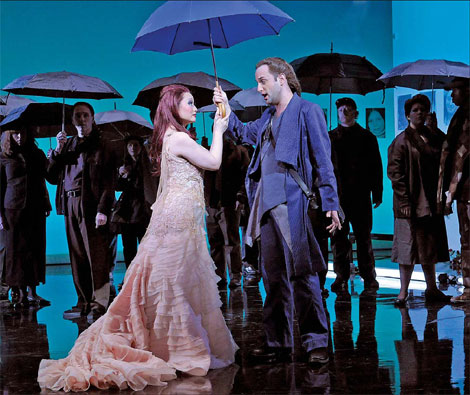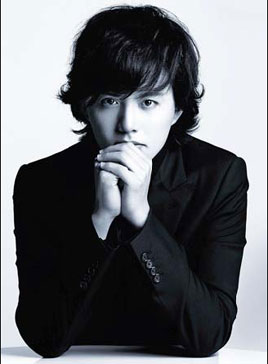Life and Leisure
Return of the Baroque
By Chen Jie (China Daily)
Updated: 2010-10-08 08:04
 |
Large Medium Small |
|
Chinese soprano Huang Ying and tenor Peter Tantsits in Madam White Snake, staged by the Boston Opera. Photos provided to China Daily |
The 13th Beijing Music Festival will celebrate a genre that is well known but little understood in China. Chen Jie reports
Mention Baroque music and many people may express a nodding familiarity with it, but probe further and they would be hard-pressed to define what exactly it is. Unlike Classical and Romantic music, Baroque music has had little exposure in China.
The English word Baroque is derived from the Italian barocco, meaning bizarre or "odd pearl".
The term was used to describe the highly decorative style of 17th and 18th century churches and public buildings in Europe and later became associated with a clearly definable type of music from around 1600 to 1750. Baroque music expresses order. It is always lively and tuneful and retains a strong impact on music to this day.
To introduce this important musical era and showcase its development, the 13th Beijing Music Festival (BMF), on till Oct 31, has adopted Baroque to Contemporary Music, as its theme.
When the Beijing Music Festival started in 1998, a time when domestic audiences had access to few high-quality concerts, the major purpose was to bring well-known orchestras and star soloists to China, Yu Long, BMF's artistic director says.
"With the boom in the classical music scene, sophisticated concert-goers are no longer satisfied listening to Lang Lang or the Berlin Philharmonic, but are more keen to know about the concert program. Hence, we now work more on giving the program a theme."
|
Chinese pianist Li Yundi will offer an all-Chopin program at the coming 13th Beijing Music Festival. |
BMF settled on Baroque, because it is now in fashion, says Tu Song, its program director.
"Music has its fashions, like everything else," Tu explains. "These days we are witnessing a resurgence of interest in Baroque music, a genre that combines beauty with order."
He reveals how, while driving home recently, he happened to listen to American pop singer-songwriter Pink's song Sober and was pleasantly surprised to discover the last eight bars had a Baroque style, beautifully matched in rhythm and feeling.
But Baroque music has been neglected in China, he says. "We have no orchestra specializing in Baroque music, the Conservatory has no Baroque major and not many musicians can play Baroque instruments."
Tu admits that he, a clarinet player himself, did not realize the beauty of Baroque music until he listened to a concert by the Tafelmusik Baroque Orchestra in Canada in 2005. The ensemble has been invited to perform at the 2010 BMF.
Christopher Hogwood, one of the most influential conductors and harpsichordists of early music, dubbed "the von Karajan of early music", will conduct the Guangzhou Symphony Orchestra to perform works by Bach and Handel, both of whom are important composers of the Baroque era. Their program also includes the Austrian composer Anton Webern's (1883-1945) Ricercar arranged from Bach's Musical Offering.
"Webern's Ricercar is a homage to Bach and also a modern exploration of early Baroque instrumental composition," Tu says.
Another strong Baroque statement will be Handel's brilliant opera Semele, produced by Brussels' Theatre Royal de la Monnaie and directed by conceptual Chinese artist Zhang Huan. Zhang sets the 1744 European opera in a 450-year-old Chinese wooden temple and makes it an interesting dialogue between the East and West. The production premiered at Theatre Royal de la Monnaie in September 2009 and all nine shows were sold out.
The festival also features many programs created by modern composers, with some paying homage to the Baroque tradition.
The Polish composer/conductor Krzysztof Penderecki will conduct the China National Symphony Orchestra to play his composition Three Chinese Songs which reflects his interest in Chinese poetry. German composer/conductor Peter Rucizka will conduct the China Philharmonic Orchestra to premiere his Holderlin Symphony for Baritone and Orchestra.
Commissioned works are an important part of BMF's programs and its 13th edition will have two big projects: operas Madam White Snake and Song of Farewell. Both are Chinese stories interpreted in the Western opera form by Chinese musicians.
Co-commissioned by the Boston Opera and Beijing Music Festival, Chinese composer Zhou Long's Madam White Snake premiered at the Boston Opera in February 2010.
In a story drawn from a beloved Chinese legend, a white snake longs to become human to experience love. She grasps it for one fleeting instant before it is swept away by a flood of deceit, doubt and distrust. Robert Woodruff, the former artistic director of the American Repertory Theater, directs the compelling and heart-breaking drama. Chinese soprano Huang Ying performs the title role. The opera is sung in English with Chinese subtitles.
Song of Farewell is composer Ye Xiaogang's first operatic endeavor. It is a modern interpretation and metamorphosis of the Peking Opera story Farewell, My Concubine. But the opera does not follow the legend about how King Xiang Yu is defeated and his concubine Yu Ji has to commit suicide. Rather, it is set in the 1920s in Beijing where a Peking Opera playwright falls for an actor but their love succumbs to the turbulence of the times.
For its opening show, BMF commissioned Canadian composer Howard Shore, best known for his score for The Lord of The Ring film trilogy, which won three Academy Awards, to score the piano concerto Ruin and Memory for Lang Lang, in celebration of the 200th anniversary of Chopin's birth.
"In a year when the whole world is commemorating the Polish composer, BMF should not miss the point," Yu says, adding that Li Yundi, the golden prize winner of the Chopin International Competition and arguably the nation's best Chopin interpreter, will offer an all-Chopin program.
"But having the best Chopin player to perform Chopin pieces is not enough and we still wanted to do something special," Yu adds.
In 2008 Yu met Shore in Los Angeles and talked about writing a piece for the China Philharmonic Orchestra. Lang Lang then indicated to Yu that he wanted to play Shore's music.
Chopin is not the only composer BMF celebrates. This year also marks the 200th anniversary of the birth of Robert Schumann. Another talented young pianist, Chen Sa, will hold a recital to commemorate the German composer.
As in every year, in addition to classical music, BMF will also present jazz, pop, and other genres to underscore its belief that music has no boundaries. No matter what forms it takes, it is for everyone to enjoy.
(China Daily 10/08/2010 page18)

